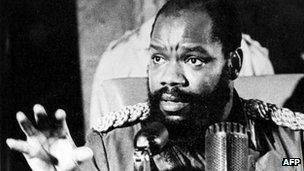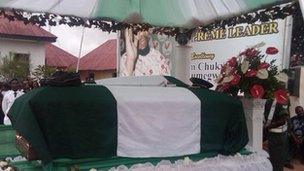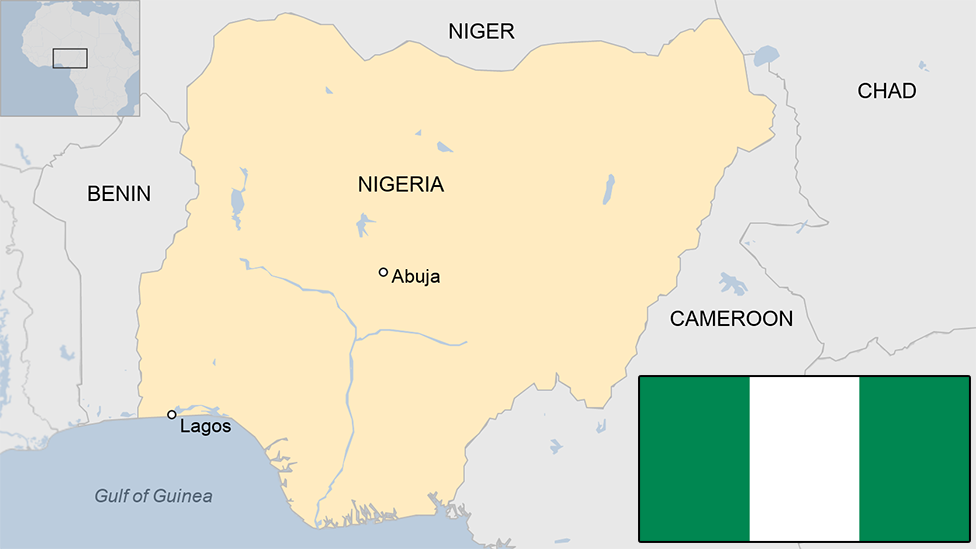Ex-Biafra leader Chukwuemeka Ojukwu buried in Nigeria
- Published

Colonel Ojukwu went into exile for more than a decade after losing the Biafran war
Thousands of people in south-eastern Nigeria have attended the funeral of former Biafran secessionist leader Chukwuemeka Odumegwu-Ojukwu.
The BBC's Fidelis Mbah, in Col Ojukwu's home town of Nnewi, said well-wishers lined the streets and climbing tall buildings to get the best view.
Col Ojukwu died in the UK last year after a long illness, aged 78.
His 1967 declaration of independence for Biafra sparked a civil war, in which more than a million people died.
He remained a prominent figure in Nigerian politics, running twice as a presidential candidate in the 2000s.
Col Ojukwu went into exile after the Biafrans surrendered in 1970, returning more than a decade later, after he was officially pardoned.
Following his amnesty, he is being granted full military honours at the funeral, with a military band playing at his family home in Nnewi, Anambra state.
'Immense love for his people'
His coffin, draped in a Nigerian flag, has been transported around the country after it was flown back to Nigeria on Monday.
Our reporter says family members, villagers, politicians and Biafra war veterans took turns to file pass the golden casket which was kept at an open space in the family compound, where female mourners dressed in garments printed with Col Ojukwu's portrait sang.
Security was tight and guests allowed into the compound, decorated with the logos of his political party, the All Progressive Grand Alliance, were screened by the anti-bomb squad.
Outside in the town, young men played their traditional drums and danced along the major roads, while all commercial activity ground to a halt.
Col Ojukwu's death appears to have bridged a gap between opposition political groups as everyone paid tributes to his doggedness and political ideology, our correspondent says.
President Goodluck Jonathan, Nobel laureate Wole Soyinka and former Ghanaian President Jerry Rawlings were among those who went to the funeral.
Following Col Ojukwu's death, the president said it was his "immense love for his people, justice, equity and fairness which forced him into the leading role he played in the Nigerian civil war".
The military was in charge of proceedings during the burial programme, with a parade and military songs performed in the late colonel's honour.

People have been paying their respects to Col Ojukwu around Nigeria this week
He was in the military before declaring independence for south-eastern Nigeria, where Igbo is the most widely spoken language, following the slaughter of thousands of ethnic Igbos in northern Nigeria.
This followed a 1966 coup carried out by Igbo officers, in which Prime Minister Abubakar Tafawa Balewa, a northerner, was shot dead.
Most of the civilians who died during the Biafran war died from hunger.
Former Biafran fighters at the funeral seemed happy with the active role played by the army and the federal government during the burial, our reporter says.
"I was an officer in the Biafran army and saw active battle in the trenches and I keep telling people we were volunteers, we were never conscripted. Ojukwu stood against injustice and pogrom and we all identified [with him]," Alphonsus Nwosu told the BBC.
"This burial is burying the civil war and memories," he said.
Col Ojukwu's Biafran aspirations where supported by Tanzania's first President, Julius Nyerere - the influential African statesman and pan-Africanist.
This support enhanced Col Ojukwu's popularity in East Africa and the conflict captivated the region, says BBC Swahili Service analyst Idd Seif.
Parks and suburbs in East Africa towns bear the name Biafra - one, in Kenya's capital, Nairobi, is known especially for its potent local brew, he says.
Rowdy sections of football stadiums in all East Africa are also known as Biafra.
- Published2 March 2012
- Published28 July 2023
